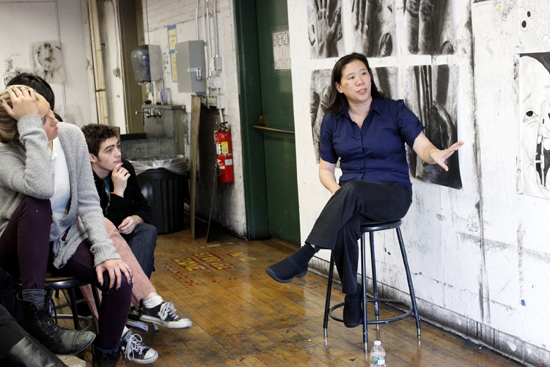A few months ago, a former student of mine contacted me. At the Rhode Island School of Design, my conversations with her had been lively and positive, and revolved around honing her technique while also developing her ideas. This time though, it was a different conversation. She had been out of art school for two years and said she felt "dead." Isolated from her local family and friends, deprived of an artistic community and dialogue, she had no one to talk to about how to go about living life as an artist in the real world. We talked through the new emotions she had been experiencing since graduation: the lack of energy and motivation, and the complete loss of creative direction and purpose. Being no stranger to any of these emotions of a new graduate, I was able to prescribe for her a concrete plan of action to confront these difficult challenges.

While it may seem like the student was the one being helped, this dialogue was mutually beneficial. For me, commiserating with another artist about these struggles makes me feel less alone and crazy in my thoughts. Despite my 14 years as a professional artist and professor of art, I still have the same fears and anxieties that loomed over me as a young art student -- and they are not going anywhere any time soon. All of these intense emotions are hidden from the artist's audience.
When we see art in person, it's beautifully presented on impeccably clean, white walls. The frame is perfectly cut; the mat is pristine; and the artist's signature effortlessly sprawls across the bottom of the artwork. When we see the artist, they are all smiles at the opening reception for their exhibition, glass of wine in one hand, accepting congratulatory gestures left and right from colleagues, friends and admirers.
What we don't see is what the artist thinking in the moments before their hand touched that paper, what they had to push through to get their art on those walls.
As a visual artist and professor of art, I've devoted my career to understanding what it means to live life as an artist in today's reality. I want to see and understand exactly what the emotional, physical and intellectual demands are to get to that immaculately framed drawing on the wall. I'm endlessly fascinated by the side of the artist's life that isn't seen or talked about.
So why aren't we talking about this? Much of an artist's life isn't pretty or romantic. I have been there, scraping dry paint off my palette, having etching ink jammed into my fingernails, feeling the callouses on my right hand get tougher all the time. Assisting my students in class, I've watched as they aggressively push the charcoal deep into the surface of the paper with their hands, rubbing the tips of their fingers raw. Those are just the physical demands of being an artist.
On top of that, the creative process is unpredictable and temperamental at best, resulting in complex layers of emotional upheaval for many artists. Many of these emotions can be ugly and brutal, leaving most artists brimming with doubt and worry.
It occurred to me after talking to my former student that this is a conversation that needs to happen, not privately, but out loud for all to hear. The result is "Ask the Art Professor," essentially an advice column for visual artists. It is your chance to ask me questions about being an artist, the creative process, career advice, about a materials, etc. Anything from the smallest technical question to the large and philosophical is welcome. I'll do my best to provide a thorough, comprehensive answer with creative and realistic strategies for tackling these issues head on. Submit your questions to me via email at: clara@claralieu.com. I look forward to hearing from you!
